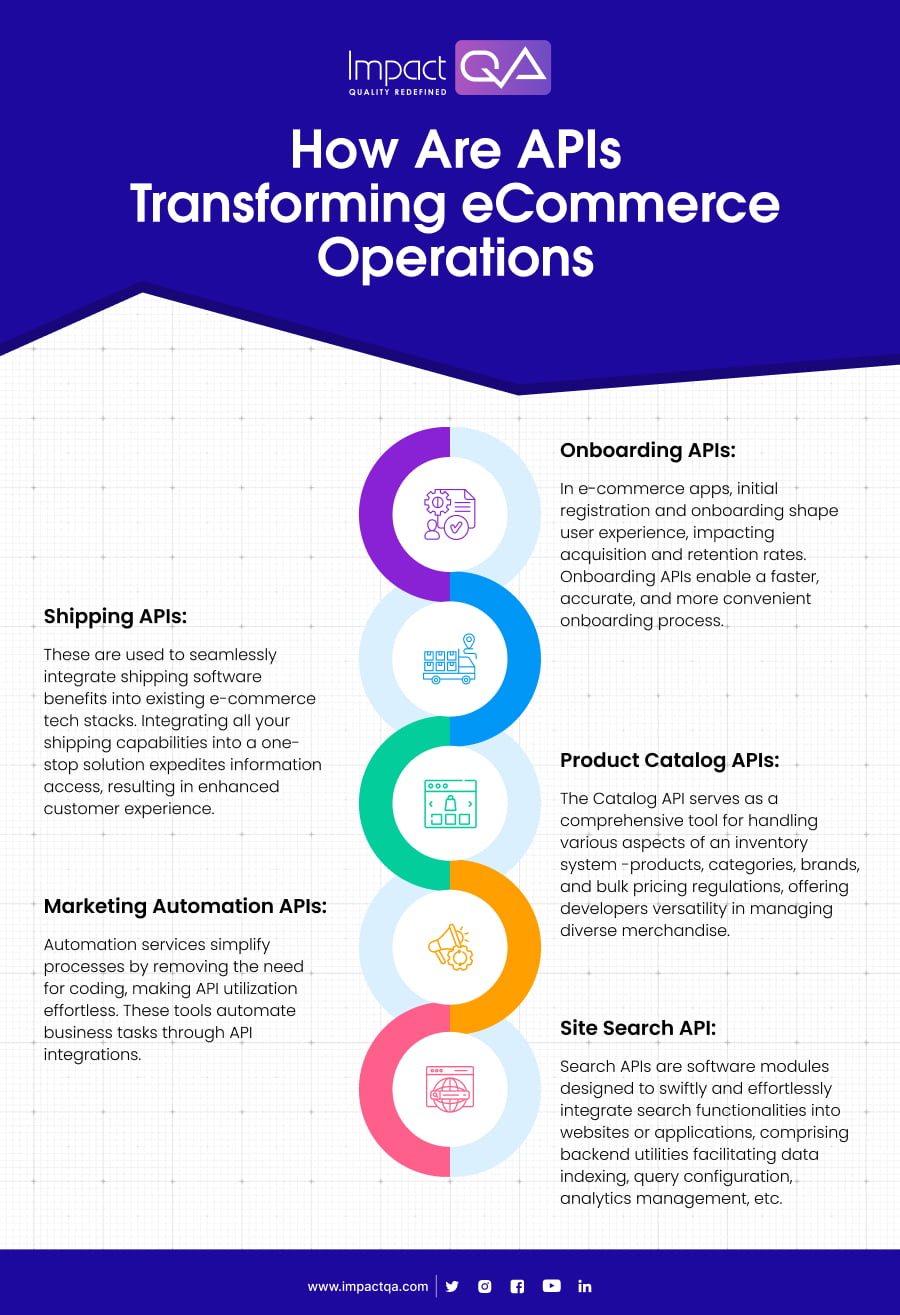Over the past two decades, the landscape of e-commerce has undergone significant expansion and transformation. Evolving digital technologies have not only reshaped consumer purchasing habits but have also redefined their expectations of the online shopping experience. Additionally, the pandemic accelerated this shift manyfold, presenting no alternatives for businesses other than to pace themselves with the rapidly evolving landscape.
Consequently, many companies have reassessed their strategies to maintain market competitiveness. Heavy migration to digital platforms has been witnessed over the last couple of years facilitated by online web stores, applications, etc., for eCommerce. Additionally, for enterprises aiming for dominance in the e-commerce industry, leveraging the power of API (Application Programming Interface) has also become key. APIs enable smooth data exchange between applications, serving as essential components of our daily digital experiences.
Let’s now delve into the API economy’s impact on e-commerce and explore how businesses can utilize e-commerce APIs to drive growth and success.
How Can Integrating APIs Benefit Your Business?
APIs represent the potential for enhancing your eCommerce operations. By incorporating APIs, you can:
- Enhance the overall customer experience, fostering satisfaction and engagement.
- Boost customer retention rates and cultivate long-term loyalty.
- Foster sales and revenue growth.
- Gain valuable insights into customer demographics and preferences, facilitating the development of tailored products and services.
How Are APIs Transforming eCommerce Operations In 2024
1. Onboarding APIs:
In e-commerce apps, initial registration and onboarding are crucial processes. They shape user experience, impacting acquisition and retention rates. A smooth onboarding process is vital for engaging potential customers and keeping them involved.
This involves user validation like DNS email checks for account legitimacy. Currency dictionaries ensure seamless transactions, converting prices to the user’s currency. Intuitive interfaces, personalized messages, and feature tours further enhance the process, building user confidence. With the integration of appropriate APIs within these applications, the whole process becomes faster, more accurate, and more convenient for users.
2. Shipping APIs:
Shipping APIs seamlessly integrate shipping software benefits into existing e-commerce tech stacks. Integrating all your shipping capabilities into a one-stop solution expedites information access, resulting in enhanced customer experience.
In other words, a shipping API is a set of code that can be seamlessly integrated and tailored to fit into your existing technological infrastructure, enabling the smooth communication and accessibility of shipping functionalities across various applications. This integration extends to:
- Your eCommerce Website
- Order Management System (OMS)
- Warehouse Management System (WMS)
3. Product Catalog APIs:
The Catalog API serves as a comprehensive tool for handling various aspects of an inventory system. It oversees not only products but also categories, brands, and bulk pricing regulations, offering developers a versatile solution for managing and organizing diverse merchandise. With this API, users can efficiently manipulate product data, implement pricing strategies, and maintain an organized structure within their catalog. Additionally, it provides functionalities for seamless integration with other systems, ensuring smooth operation across multiple platforms and enhancing overall efficiency in e-commerce and retail environments.
4. Marketing Automation APIs:
Automation services streamline processes by eliminating the necessity for coding, thus rendering API utilization effortless. These services encompass a range of tools designed to automate various business tasks through API integrations. For instance, they can facilitate the automatic addition of website customers to email lists and further categorize them based on their purchasing behavior or expenditure. Additionally, they enable the seamless synchronization of data across different platforms, enhancing efficiency and enabling businesses to focus on core objectives rather than mundane operational tasks.
5. Site Search API:
Search APIs are software modules designed to swiftly and effortlessly integrate search functionalities into websites or applications. They primarily comprise backend utilities facilitating data indexing, query configuration, analytics management, and beyond. Pre-configured Search APIs are available for Python, PHP, Java, and various other programming languages, reducing the coding workload for developers. Crafting a search tool that fulfills all the expectations of end-users demands extensive proficiency in multilingualism, human-computer interactions, and computer systems. Search APIs embed this expertise within their code, enabling developers to seamlessly integrate powerful, swift, and contemporary search functionalities into their websites or applications.
Conclusion
In conclusion, eCommerce APIs play a vital role in improving user experiences and driving sales in the digital realm. Businesses must recognize the advantages of integrating these APIs and explore the available solutions. By incorporating e-commerce APIs into their strategies, businesses can utilize data for targeted marketing, streamline inventory management, ensure secure transactions, and make informed decisions through analytics. This transformative capability underscores the importance of embracing APIs to thrive in the ever-changing digital environment, ensuring exceptional experiences for customers.



